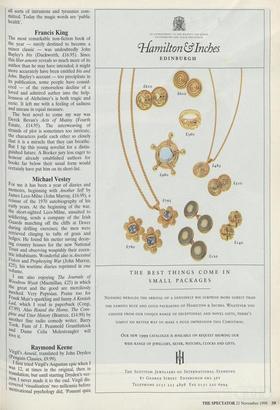Raymond Keene
Virgil's Aeneid, translated by John Dryden (Penguin Classics, £9.99). I first tried Virgil's Augustan epic when I Was 12, at times in the original, then in translation, but until starting Dryden's ver- sion I never made it to the end. Virgil dis- covered 'visualisation' two millennia before Motivational psychology did, Possunt quia posse videntur' being beautifully rendered by Dryden, 'For they can conquer who believe they can.'
Egypt by Vivian Davies and Renee Fried- man (British Museum Press, £20). At last a book which brings Egypt down to earth, co- authored by the keeper himself from the British Museum and the director of the expedition to Hierakonpolis, Egypt's first capital. No, it was not aliens or antique super-beings who constructed the pyra- mids, it was done by extraordinary human beings. The illustrations are fabulous and much of it reads like a Whodunnit (Imhotep and Khasekhemwy actually.) One Jump Ahead by Jonathan Schaeffer (Springer, US$ £34.95). A thrilling account of the first ever man v. machine world championship, when the septuagenarian American draughts champion, Dr Marion Tinsley, took on the Chinook super- computer which could analyse millions of positions a second. Tinsley, unlike Kas- parov last year, won, but, chivalrously, Pro- fessor Schaeffer, who programmed the machine, wrote the book about it.
Most overrated book of the year: Longi- tude by Dava Sobel (Fourth Estate, £12). `The true story of a lone genius who solved the greatest scientific problem of his time' is one way of looking at it. To me, clock- maker John Harrison comes across as a cantankerous pain in the neck who would not take 'yes' for an answer. It was in fact poor maligned Nevil Makelyne, the Astronomer Royal, who actually had to deal with Harrison, who brought the prime meridian to Greenwich — as the book grudgingly and belatedly acknowl- edges.



















































































 Previous page
Previous page